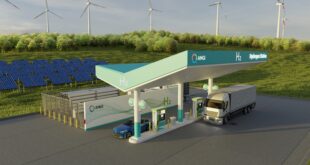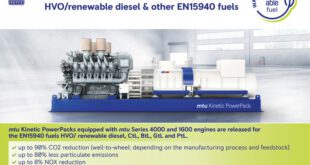Alternative Energy Series
Ed Howes
As a freshman in high school, I failed chemistry class due to an extreme disinterest in the entire subject. I do recall a demonstration in which the teacher hooked a large one and a half volt battery to a glass and wire electrolyzer that transformed water into separated hydrogen and oxygen. I would later learn that commercial hydrogen and oxygen producers also used this method in an inefficient manner that requires more energy than the fuel produced can generate through combustion.
In the late eighties I would learn that a boy genius in California learned to make hydrogen from water efficiently with a twelve volt battery and standard auto electrical system, during the 1970s. Around 1990, my machinist neighbor built a hydrogen generator that did not work due to defects in the plans the boy genius had drawn up in prison when he was no longer a boy.
My neighbor was not interested in correcting the defect when it was discovered and I was only a bit disappointed. My father was a hobby style inventor and he gave me a good idea for a cheaper and much more effective 12 volt hydrogen generator. I never got around to building it and decided there was no point in separating the oxygen and the hydrogen after splitting the water.
Because the [tag]hydrogen[/tag] and oxygen have opposite electrical charges, they readily recombine as a compound I call hydrox. The man who discovered this gas and fooled with it to make underwater welders and cutting torches, named the gas after himself, so hydrox is also known as Browns gas. Simply put, hydrox is an oxygenated fuel, which means it burns hotter and faster than a non oxygenated fuel. In WWII the Germans used hydrogen peroxide as a liquid rocket fuel. H2O2 is a super oxygenated fuel, highly caustic, corrosive and dangerous to work with. Hydrox, however, is no more corrosive than water. Flat plate electrodes one sixteenth inch apart, made of stainless steel will last a long time if clean water is used. Clean water can be had from relatively inexpensive filters which can be carried on a vehicle. Having a good filter can also help supply one with potable water when clean water no longer flows from the pipes at home.
Big Energy talks only about a hydrogen economy – using expensive technology to manufacture a product that can be made inexpensively by anyone who wants it. The idea of water power is far too democratic to control. The rain falls both on the just and the unjust. If people put water in their fuel tanks and make enough fuel with a few watts of electricity that then makes kilowatts or megawatts of power in a combustion engine, who will buy hydrogen at fueling stations? Most Americans buy water cheaply compared to its value because of its relative abundance. In the U.S. it is usually cheaper to buy than to collect, store or drill for. Dry nations only need water pipelines from neighboring wet nations. Seaside countries can desalinate and filter sea water and pipe where needed. How can the corporate fascists gain control of water? Only by convincing everyone we need their new technology.
Water is to democratic energy access as the internet is to democratic discussion, information distribution and personal activism. This fact will be concealed for as long as possible and a few of us will be wise to the game. Without water we cannot live long. It exists in altered forms with special properties. When we know what there is to know about water, we will be wiser than any who have come before.
Engineers forge ahead building [tag]hydrogen fuel cells[/tag]. These cells apparently generate electricity by recombining hydrogen and oxygen. This means that hydrox will not be suitable as fuel cell fuel. However, simple electrolysis costs little more to collect the two gasses separately and send them to the appropriate ports of the fuel cell. Thus, water can power these fuel cells as easily as combustion engines of many types, including jet and rocket engines. It is also likely from basic chemistry that steam is more easily electrolyzed than liquid water. Temperature rises speed chemical reactions. Steam is quite easy to create with combustion engines, which are the space heaters for the great outdoors.
I often wonder why greenhouse gasses are so readily blamed for global warming, while billions of super space heaters are seldom accused of much contribution. Fuel cells would be a fine solution to all this combustion heat. How many volcanoes would we need to equal the heat of transportation every day? Are we not burning up the planet one day at a time especially for the sake of corporate profit? Why do we so willingly play the game of dont blame me, I just do as Im told?
When water is our fuel, the environment does not suffer crisis when a spill occurs on a highway, an ocean or a storage container ruptures. When water is our fuel, old ships can run aground, break up in a storm and not destroy hundreds of miles of coastline and wildlife environment. When water is our fuel, cars do not burst into flame during rear end collisions. The great betrayers of humanity have known what I am saying for more than a hundred years, and dont want us to have water power. Is it not time for some changes? Shall we choke ourselves and our children for corporate profits? What is our reward?
Hydrogen and hydrox are both gaseous fast burn fuels, just as vaporized alcohol, gasoline and diesel; except even faster burning with much greater power potential, also producing the usual oxides of nitrogen, unless in fact such oxides mostly form in slow burn engines due to the long burn time. In this case we can expect greatly reduced oxides of nitrogen with water fuel, as well. When we make water fuel at home we can operate stoves and heaters and combustion or fuel cell electric generators and make electricity for a few pennies per kilowatt. Do you imagine the electric utilities will be happy they do not need to purchase more generating capacity? Will they want us to supply them at wholesale prices? Could developing countries adopt water power and internet connections to vault ahead to the 21st Century? Is clean, cheap power a huge threat to all the traditional power? Of course it is. That is why the science savior has not provided us with this miracle of the 19th Century. How does it feel to be one or two centuries behind existing technology? Is it not shameful and embarrassing? Humiliating?
The corporate scientists, engineers and [tag]energy[/tag] experts will continue telling us it is impossible to make hydrogen as cheaply as some garage and basement scientists and engineers have been doing for decades. The sad thing is we will just say OK, we believe you. There is no such thing as conspiracy except in the mind of radicals.
Freelance writer published on many websites and newspapers.
justantherview.com [email protected]
 Alternative Energy HQ solar power for homes, wind energy, and bio fuel issues
Alternative Energy HQ solar power for homes, wind energy, and bio fuel issues






Yes, one of the advantages of producing systems whose main byproduct is water is that the pollution problem can be VASTLY cut down. For example, the Ecotality Hydratus (www.ecotality.com), co-developed with NASA and JPL, is a hydrogen-on-demand system whose main byproduct is water. Of course, you might still have some impact depending on where and how you get the materials to make the system, but the main one in the Hydratus is magnesium, which is easily extractable from such sources as seawater, so you could possibly even avoid many of the mining/extraction impacts that way.